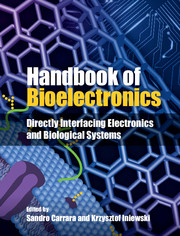Book contents
- Frontmatter
- Contents
- List of Contributors
- 1 What is bioelectronics?
- Part I Electronic components
- Part II Biosensors
- 8 Introduction to biosensors
- 9 CNT and proteins for bioelectronics in personalized medicine
- 10 CMOS nanowire biosensing systems
- 11 Cell-array biosensors
- 12 System-on-a-chip pulse radar for contactless motion sensing in human–machine smart interfaces
- 13 MagCMOS
- 14 Metamorphic neural interfaces with insects for remote controlled biobots
- Part III Fuel cells
- Part IV Biomimetic systems
- Part V Bionics
- Part VI Brain interfaces
- Part VII Lab-on-a-chip
- Part VIII Future perspectives
- Index
- References
9 - CNT and proteins for bioelectronics in personalized medicine
from Part II - Biosensors
Published online by Cambridge University Press: 05 September 2015
- Frontmatter
- Contents
- List of Contributors
- 1 What is bioelectronics?
- Part I Electronic components
- Part II Biosensors
- 8 Introduction to biosensors
- 9 CNT and proteins for bioelectronics in personalized medicine
- 10 CMOS nanowire biosensing systems
- 11 Cell-array biosensors
- 12 System-on-a-chip pulse radar for contactless motion sensing in human–machine smart interfaces
- 13 MagCMOS
- 14 Metamorphic neural interfaces with insects for remote controlled biobots
- Part III Fuel cells
- Part IV Biomimetic systems
- Part V Bionics
- Part VI Brain interfaces
- Part VII Lab-on-a-chip
- Part VIII Future perspectives
- Index
- References
Summary
From their discovery, CNTs have increasingly attracted interest because oftheir peculiar electrical, mechanical, and chemical properties. In 1991,Sumio Iijima first observed and described in detail the atomic arrangementof this new type of carbon structure [1]. By a technique used for fullerenesynthesis, he produced needle-like tubes at the cathode of an arc-dischargeevaporator. From that time, carbon nanotubes have been used for manyapplications and represent one of the most typical building blocks used innanotechnology. Their peculiarities include unique properties of fieldemission and electronic transport, higher mechanical strength with respectto other materials, and interesting chemical features.
The use of CNTs has recently gained momentum in the development ofelectrochemical biosensors, since their utilization can create devices withenhanced sensitivity and detection limit capable of detecting compounds inconcentrations comparable to those present in the human body.
This chapter will review the most important features of carbon nanotubes, andpresent an example in which their application can enhance the detection ofdrugs and metabolites relevant in personalized medicine: P450 biosensors fortherapeutic drug monitoring.
Overview
Carbon is a very interesting element, since it can assume several stablemolecular structures. Any molecule entirely composed of carbon is called afullerene.
Information
- Type
- Chapter
- Information
- Handbook of BioelectronicsDirectly Interfacing Electronics and Biological Systems, pp. 109 - 121Publisher: Cambridge University PressPrint publication year: 2015
